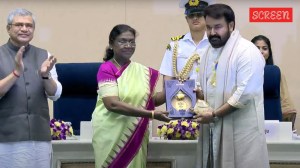Most visible face of peace has Indian past
The anti-war movement may not be visible in India’s Capital but its most visible face has New Delhi connection. As television channels ...

The anti-war movement may not be visible in India’s Capital but its most visible face has New Delhi connection. As television channels last week beamed live telecasts of French Foreign Minister Dominique de Villepin’s hard-hitting speech on Iraq in the UN Security Council, the images brought back memories to his many friends in New Delhi.
As it happens, de Villepin served as the second counsellor at the French Embassy in India in 1989-90 and then as the first counsellor in 1990-92. During that time, he became well-known in Delhi’s art and partying circuit, and still boasts a large circle of friends in the city. Articulate, erudite, a tad arrogant, and incapable of standing fools — that’s how they describe him.
Says art historian Aman Nath: ‘‘Villepin and his pretty wife Marie Laure used to make a great couple and would visit many art galleries and exhibitions. He nurtures a great interest in art and used to have an impressive collection of French etchings and gravures at his residence.’’
Nath’s business partner Francis Wacziarg — a Frenchman who has settled down in India — also features prominently on the list of de Villepin’s Indian friends, along with artists S H Raza and Ram Kumar and socialite Vandana Singh.
‘‘Even the late painter J Swaminathan used to be a permanent fixture at his parties which used to be thrown at his Vasant Vihar residence,’’ recalls Kuchipudi exponent Raja Reddy who says he knew de Villepin well. Reddy was once invited by the former diplomat to perform the entire Ramayana at a dance festival in Paris.
‘‘He was so knowledgeable about Indian dance forms that he used to even talk about mudras at his parties,’’ says Reddy. Dominique de Villepin is a product of ENA, French National School of Administration. Those who know him believe that his fascination for India was a result of being influenced by the famous French resistance leader Andre Malraux, himself an India enthusiast.
Wacziarg, who knew the minister’s father, remembers de Villepin senior telling him that his son was being posted to India. ‘‘I promised to brief Dominique about India, which I did. And he took to the country so well.’’ In his three years in Delhi and his subsequent interaction with Indians, de Villepin had even learnt a smattering of Hindi. Senior journalist Dileep Padgaonkar remains a close friend. ‘‘I know Dominique as a person who travelled extensively in India and read a lot about our civilisation and culture,’’ says Padgaonkar who compares his captivating personality with that of Bill Clinton. ‘‘Being a typical Frenchman he’s always attracted to irony and paradox, which he found in ample supply in the manner in which ancient India was dealing with modernity,’’ he adds.
Another acquaintance reveals: ‘‘Villepin is very fond of Indian literature, not only contemporary but also ancient, even the Sanskrit works of Kalidas.’’ Which was apparent during the Belles Etrangeres literary festival late last year in Paris. A 20-member delegation of Indian authors had participated. One of them says: ‘‘We were surprised to find the foreign minister welcoming us when we reached Paris. And he continued to interact with us throughout our stay and even invited us to his residence there.’’
Film afficionado Aruna Vasudev didn’t know de Villepin during his diplomatic tenure in Delhi, but recounts her brief encounter with the minister last August when he made his first official visit to the country after getting the job. ‘‘I was sitting next to him at the dinner table and poet Ashok Vajpeyi was sitting next to him. Despite being on a political visit he talked throughout the dinner, on Indian films, arts and poetry,’’ says Vasudev.
Photos



- 01
- 02
- 03
- 04
- 05




























